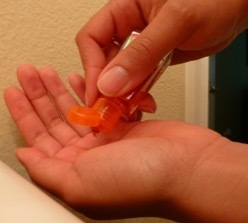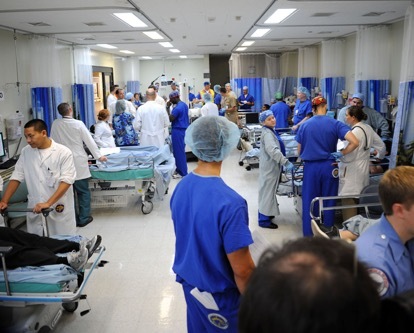With the recent confirmation of the first U.S. case of truly antibiotic-resistant bacterial infection, public health officials' concerns regarding overuse of antibacterial and antibiotics have been realized. The sudden ubiquity of antibiotics in everyday products advocates, falsely, that heavy use of antibacterial products is beneficial and even a necessity for public health. A 2011 study of antibacterial soap use found that almost half of all Americans seek out and regularly use antibacterial soap products. Such trends are alarming as the unnecessary use of antibacterial products and antibiotics is not harmless but can pose a serious risk to individuals and their communities.
A 2011 study of antibacterial soap use found that almost half of all Americans seek out and regularly use antibacterial soap products. Such trends are alarming as the unnecessary use of antibacterial products and antibiotics is not harmless but can pose a serious risk to individuals and their communities.
While antibiotics are crucial to protecting patients and communities from the spread of infectious diseases, their misuse and overuse can generate antibiotic-resistant bacteria. How does this happen? Despite removal of susceptible bacteria initially, unnecessary prescription of antibiotics or heavy use of antibacterial products has a tendency to leave a small population of stronger, antibiotic-resistant mutants behind. In most cases, resistant bacteria make it harder to treat infections in patients, and negatively impact entire communities should the resistant bacteria population spread--which is likely as antibiotic resistance spreads rapidly between bacteria.
Noting the dangers of overuse of antibiotics, the Centers for Disease Control and Prevention (CDC), U.S. Food and Drug Administration (FDA), World Health Organization (WHO), and others have issued recommendations in recent years for both health officials and the general public aimed at combating bacterial resistance. These include suggestions for when antibiotics should be prescribed based on diagnosis, strategies for minimizing the spread of infections, and effective patient education approaches.  Despite these efforts, a recently published study found that as much as 30 percent of total antibiotic prescriptions given in physician offices and clinics were unnecessary.
Despite these efforts, a recently published study found that as much as 30 percent of total antibiotic prescriptions given in physician offices and clinics were unnecessary.
A host of new research shows antibiotic use can negatively impact a patient's microbiome, the collection of benign bacteria that live on the outer and inner surfaces of the human body, and partner with the body to benefit human health. These advantageous microbes provide a protective front against harmful germs by creating a layer of bacteria called a "biofilm." This protective layer, in turn, discourages new microbes from gaining a foothold on or in the body. How do antibiotics harm the microbiome? Antibiotics can result in partial removal of our body's natural bacterial communities in addition to the targeted harmful bacteria. Partial eradication by antibiotics of the biofilm allows other, potentially harmful species of bacteria to move in and colonize the body. This opening also allows for antibiotic resistant mutants to proliferate into a more severe infection.
Research shows that reduced exposure to microbes early in life impairs the immune system's ability to identify detrimental bacteria from harmless substances like pollen and peanuts. Later in life, the poorly trained immune system may overreact and cause allergic reactions when exposed to such harmless triggers. The prevalence of allergies worldwide has been steadily increasing over the last 50 years, with 40-50 percent of schoolchildren currently estimated to be sensitized to one or more allergens. Perhaps not coincidentally, these incidence rates closely mirror the increased use of antibiotics in industrialized nations.
It's worth stressing that when prescribed only as necessary, antibiotics still hold an important place in improving the health of patients and the community. By using antibiotics wisely, we can prevent both coddling our immune systems and the disruption of our bodies' natural biological processes. In their efforts to find new approaches to fighting harmful bacteria without harming the microbiome, researchers are actively studying how our microbial populations protect us and how microbial imbalances cause disease. As for all those antibacterial products in your kitchen cabinet? The news is not exactly good. Within the past decade, numerous studies found no additional benefits over non-antibacterial varieties for killing disease-causing germs.
